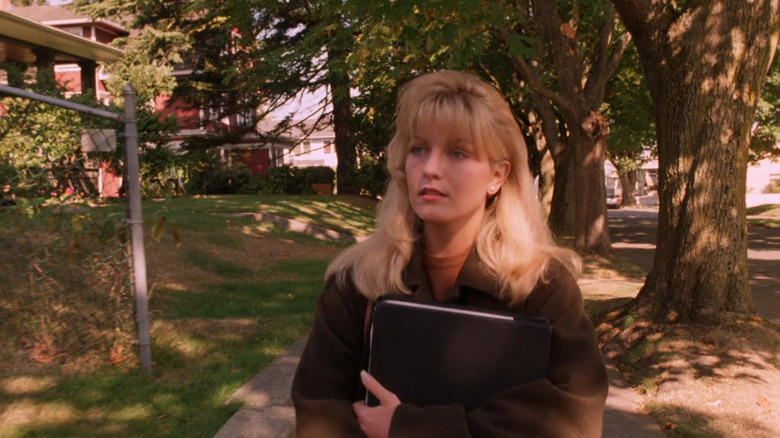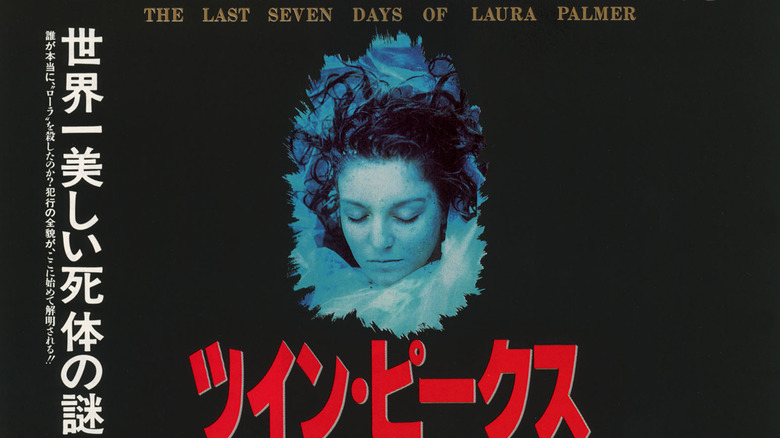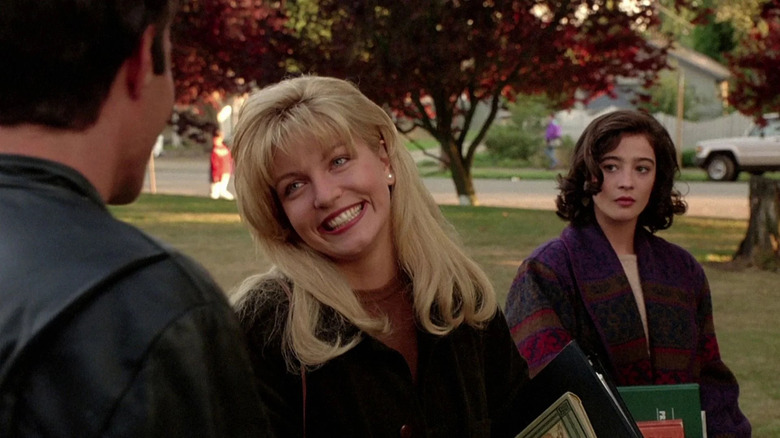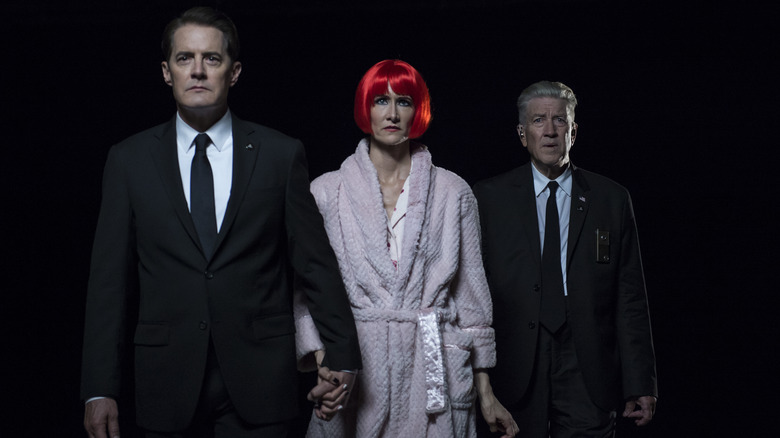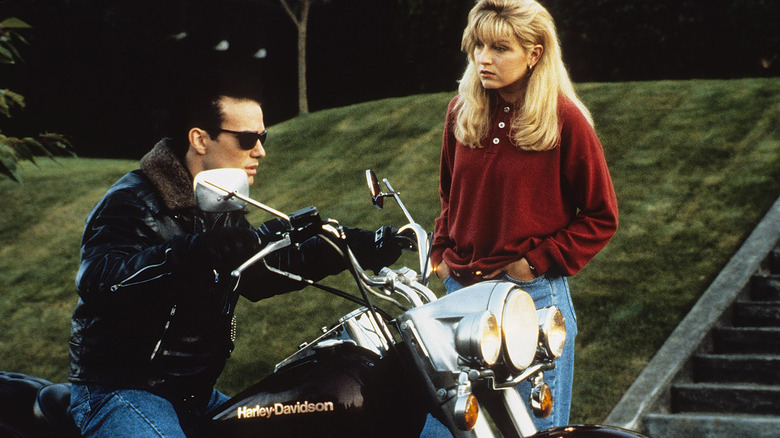David Lynch Has Always Loved Fire Walk With Me, Even When Nobody Else Did
David Lynch has made a lot of great movies, but "Twin Peaks: Fire Walk With Me," might be his best. It's a prequel to his hit TV show "Twin Peaks," one that follows Laura Palmer (Sheryl Lee) around throughout the final week of her life. After two seasons of hearing about Laura in the past tense, this movie reminded us of something most murder mystery shows tend to lose sight of: that the victim was a real person with a full life, not just a mystery to be solved. "Fire Walk With Me" is a sad, terrifying, deeply emotional film, one that gives Laura a voice for one of the few times in the series.
Unfortunately, the movie was both a financial and critical disappointment at the time. "Twin Peaks" fans who wanted a resolution to the second season's massive cliffhanger were disappointed that the movie didn't resolve any of that. Critics complained that the movie was boring and nonsensical. "Fans of the dark comedy will find little to laugh about — unless it is Lynch's pretentiousness — in this horrific look at Laura's last seven days," Rita Kempley wrote in the Washington Post. Even harsher is New York Times critic Vincent Canby's zinger: "It's not the worst movie ever made; it just seems to be."
Quentin Tarantino had one of the harshest high-profile responses, declaring shortly afterward, "David Lynch had disappeared so far up his own ass that I have no desire to see another David Lynch movie until I hear something different." Quite possibly the only people in 1992 who didn't outright hate the film were viewers in Japan.
Japan's Peaksmania
As "Twin Peaks" was fading into obscurity in '92 America, the show was becoming insanely popular in Japan, and no one seemed 100% sure why. After all, more popular and acclaimed American shows like "Dallas" and "Dynasty" failed to make an impression. According to the New York Times, thousands of Japanese fans in 1992 got together to throw "mock funerals for Laura Palmer in Tokyo and two other cities," and the nation's food industry saw an "increase in the popularity of cherry pie," Dale Cooper's favorite food.
In a reverse of the usual trends, "Fire Walk With Me" actually released in Japan several months before it released in America, and was a much bigger hit. "We're booked into more than 100 theaters around Japan," the movie's Japanese distributor told the LA Times. "That's the equivalent of a 2,000-theater release in the U.S. This is going to be one of the top 10 films of the year."
"We are tired of regular dramas with regular human relationships," said a Japanese fan at the time who was in both a "Twin Peaks" fan club and a club specifically for Kyle MacLachlan, "Each character is very vivid ... Even if I see it many times, I don't get bored."
Still, Japanese fans tended to prefer the show to the prequel film. "Even among those who have seen the show, opinions have been mixed," NYT reported. It wasn't enough to kill the Peaks' fever going on, but even in a time and place where fans were as excited as ever, the movie was still a bit of a letdown.
It was definitely a step up compared to the reaction in the States, however, where it was nearly the death of Lynch's career.
Lynch's career low point
After the cancellation of "Twin Peaks" and the failure of the prequel movie, Lynch was largely seen as having lost his touch throughout the '90s. In one interview, he described the period after "Fire Walk With Me" as a "black cloud" over his career. It was five years before his next film was released, also to mixed reviews. Like FWWM, the 1997 neo-noir horror film "Lost Highway" was surreal and a little confusing, and audiences and critics didn't seem to be in the mood for it.
It was only after Lynch directed "The Straight Story" in 1999, a surprisingly straight-forward Disney film, that he got positive reviews again. When he made another surreal, ambiguous neo-noir film with "Mulholland Drive" in 2001, critics seemed to have finally gotten back on board with Lynch's madness; the film was well received, even by critics who'd never been shy to bash Lynch's previous works.
So although the black cloud parted, it took awhile. You'd expect that to leave Lynch with some sort of reluctance to go back to the level of weirdness in "Fire Walk With Me." When it was first announced that Showtime had greenlit a revival of "Twin Peaks," you'd think Lynch would try to make "The Return" closer in tone to the first season of the popular show, not the unpopular prequel that nearly ruined him. Instead he announced ahead of time that the prequel would be "very important" to understanding the revival, and he wasn't kidding.
The Return
Sure enough, "The Return" was a very, very strange show. It's a final season that spent surprisingly little time in the town of Twin Peaks, and even less time with the beloved Dale Cooper. "The Return" didn't just double down on the surreal and supernatural elements of the prequel in the premiere — it escalated things even further from there. At one point, the show takes us further and further inside the explosion of a nuclear bomb, revealing that by splitting the atom, humans have unknowingly created a hole in our reality, of which malevolent supernatural creatures were able to slip through and start to wreak havoc on humanity. (At least, we think that's what happened there. Not 100% sure.)
With "The Return," Lynch made an active choice to avoid giving the audience exactly what they expected or wanted from a revival, just as the prequel refused to give "Peaks" fans what they expected or wanted. The difference is that this time around, viewers seemed to be on board. "The Return" was a massive critical success, making it onto the top of pretty much every "best shows of the year" list published at the end of 2017. Lynch absolutely refused to cater to the same mass audiences the original first season appealed to; he created something entirely on his own terms, and this time it clearly paid off. By doing so, he also ensured that "Fire Walk With Me" will forever be considered required viewing for anyone getting into the series for the first time.
Lynch never gave up on the film
Lynch's first commercial failure of a film was his 1984 adaptation of "Dune," for which he was also heavily criticized. But even as the "Twin Peaks" prequel was getting bashed by critics and ignored by American audiences, he never disowned the movie like he disowned "Dune." As he told Deadline in 2018:
"With 'Dune,' I sold out on that early on, because I didn't have final cut, and it was a commercial failure, so I died two times with that. With 'Fire Walk With Me,' it didn't go over well at the time, but I loved it so I only died once, for the commercial failure and the reviews and things."
Tides turned in the movie's favor, but even if it didn't, we know Lynch wouldn't have changed his mind about it anyway. The movie got to the core of what the show had always been about: a lonely, troubled teenaged girl who desperately needed help that nobody around her was quite able to give.
"I always loved Laura Palmer," Lynch said in 2014, "and in the series she's dead, so I loved the idea of seeing the last week of her life." It may not have been what many fans wanted from a "Twin Peaks" movie, but it was what the series needed. Laura was always the heart of the show, and we salute Lynch for staying true to that even when the whole world seemed to be against him. "Fire Walk With Me" has always been a masterpiece, even back when no one seemed to know it.
